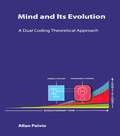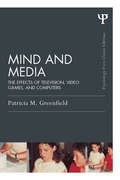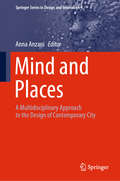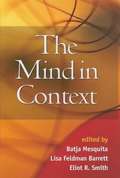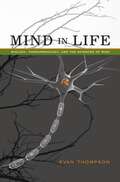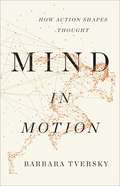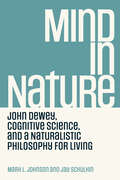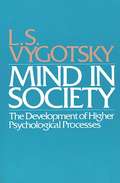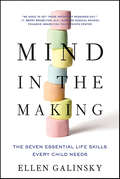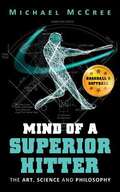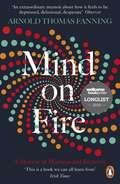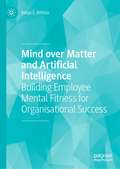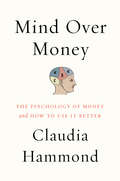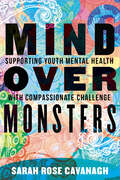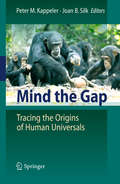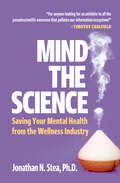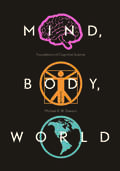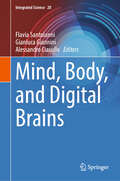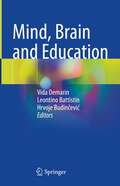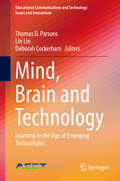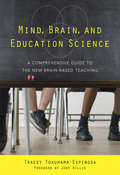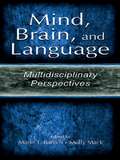- Table View
- List View
Mind and Its Evolution: A Dual Coding Theoretical Approach
by Allan PaivioThis book updates the Dual Coding Theory of mind (DCT), a theory of modern human cognition consisting of separate but interconnected nonverbal and verbal systems. Allan Paivio, a leading scholar in cognitive psychology, presents this masterwork as new findings in psychological research on memory, thought, language, and other core areas have flourished, as have pioneering developments in the cognitive neurosciences. Mind and Its Evolution provides a thorough exploration into how these adaptive nonverbal and verbal systems might have evolved, as well as a careful comparison of DCT with contrasting "single-code" cognitive theories. Divided into four parts, this text begins with a general, systematic theory of modern human cognition as the reference model for interpreting the cognitive abilities of evolutionary ancestors. The first half of the book discusses mind as it is; the second half addresses how it came to be that way. Each half is subdivided into two parts defined by thematic chapters. Mind and Its Evolution concludes with evidence-based suggestions about nourishing mental growth through applications of DCT in education, psychotherapy, and health. This volume will appeal to cognitive and evolutionary psychologists, as well as students in the areas of memory, language, cognition, and mind evolution specialists in psychology, philosophy, and other disciplines.
Mind and Its Evolution: A Dual Coding Theoretical Approach
by Allan PaivioThis book updates the Dual Coding Theory of mind (DCT), a theory of modern human cognition consisting of separate but interconnected nonverbal and verbal systems. Allan Paivio, a leading scholar in cognitive psychology, presents this masterwork as new findings in psychological research on memory, thought, language, and other core areas have flourished, as have pioneering developments in the cognitive neurosciences. Mind and Its Evolution provides a thorough exploration into how these adaptive nonverbal and verbal systems might have evolved, as well as a careful comparison of DCT with contrasting "single-code" cognitive theories. Divided into four parts, this text begins with a general, systematic theory of modern human cognition as the reference model for interpreting the cognitive abilities of evolutionary ancestors. The first half of the book discusses mind as it is; the second half addresses how it came to be that way. Each half is subdivided into two parts defined by thematic chapters. Mind and Its Evolution concludes with evidence-based suggestions about nourishing mental growth through applications of DCT in education, psychotherapy, and health. This volume will appeal to cognitive and evolutionary psychologists, as well as students in the areas of memory, language, cognition, and mind evolution specialists in psychology, philosophy, and other disciplines.
Mind and Media: The Effects of Television, Video Games, and Computers (Psychology Press & Routledge Classic Editions)
by Patricia M. GreenfieldPatricia M. Greenfield was one of the first psychologists to present new research on how various media can be used to promote social growth and thinking skills. In this now classic, she argues that each medium can make a contribution to development, that each has strengths and weaknesses, and that the ideal childhood environment includes a multimedia approach to learning. In the Introduction to the Classic Edition, Greenfield shows how the original edition set themes that have extended into contemporary research on media and child development, and includes an explanation of how the new media landscape has changed her own research and thinking.
Mind and Places: A Multidisciplinary Approach to the Design of Contemporary City (Springer Series in Design and Innovation #4)
by Anna AnzaniThis book explores the contributions of psychological, neuroscientific and philosophical perspectives to the design of contemporary cities. Pursuing an innovative and multidisciplinary approach, it addresses the need to re-launch knowledge and creativity as major cultural and institutional bases of human communities. Dwelling is a form of knowledge and re-invention of reality that involves both the tangible dimension of physical places and their mental representation. Findings in the neuroscientific field are increasingly opening stimulating perspectives on the design of spaces, and highlight how our ability to understand other people is strongly related to our corporeity. The first part of the book focuses on the contributions of various disciplines that deal with the spatial dimension, and explores the dovetailing roles that science and art can play from a multidisciplinary perspective. In turn, the second part formulates proposals on how to promote greater integration between the aesthetic and cultural dimension in spatial design. Given its scope, the book will benefit all scholars, academics and practitioners who are involved in the process of planning, designing and building places, and will foster an international exchange of research, case studies, and theoretical reflections to confront the challenges of designing conscious places and enable the development of communities.
Mind in Context
by Lisa Barrett Batja MesquitaMost psychology research still assumes that mental processes are internal to the person, waiting to be expressed or activated. This compelling book illustrates that a new paradigm is forming in which contextual factors are considered central to the workings of the mind. Leading experts explore how psychological processes emerge from the transactions of individuals with their physical, social, and cultural environments. The volume showcases cutting-edge research on the contextual nature of such phenomena as gene expression, brain networks, the regulation of hormones, perception, cognition, personality, knowing, learning, and emotion.
Mind in Life: Biology, Phenomenology, and the Sciences of Mind
by Evan ThompsonHow is life related to the mind? Thompson explores this so-called explanatory gap between biological life and consciousness, drawing on sources as diverse as molecular biology, evolutionary theory, artificial life, complex systems theory, neuroscience, psychology, Continental Phenomenology, and analytic philosophy. Ultimately he shows that mind and life are more continuous than previously accepted, and that current explanations do not adequately address the myriad facets of the biology and phenomenology of mind.
Mind in Motion: How Action Shapes Thought
by Barbara TverskyAn eminent psychologist offers a major new theory of human cognition: movement, not language, is the foundation of thoughtWhen we try to think about how we think, we can't help but think of words. Indeed, some have called language the stuff of thought. But pictures are remembered far better than words, and describing faces, scenes, and events defies words. Anytime you take a shortcut or play chess or basketball or rearrange your furniture in your mind, you've done something remarkable: abstract thinking without words. In Mind in Motion, psychologist Barbara Tversky shows that spatial cognition isn't just a peripheral aspect of thought, but its very foundation, enabling us to draw meaning from our bodies and their actions in the world. Our actions in real space get turned into mental actions on thought, often spouting spontaneously from our bodies as gestures. Spatial thinking underlies creating and using maps, assembling furniture, devising football strategies, designing airports, understanding the flow of people, traffic, water, and ideas. Spatial thinking even underlies the structure and meaning of language: why we say we push ideas forward or tear them apart, why we're feeling up or have grown far apart. Like Thinking, Fast and Slow before it, Mind in Motion gives us a new way to think about how--and where--thinking takes place.
Mind in Nature: John Dewey, Cognitive Science, and a Naturalistic Philosophy for Living
by Jay Schulkin Mark L. JohnsonA dialogue between contemporary neuroscience and John Dewey&’s seminal philosophical work Experience and Nature, exploring how the bodily roots of human meaning, selfhood, and values provide wisdom for living.The intersection of cognitive science and pragmatist philosophy reveals the bodily basis of human meaning, thought, selfhood, and values. John Dewey's revolutionary account of pragmatist philosophy Experience and Nature (1925) explores humans as complex social animals, developing through ongoing engagement with their physical, interpersonal, and cultural environments. Drawing on recent research in biology and neuroscience that supports, extends, and, on occasion, reformulates some of Dewey's seminal insights, embodied cognition expert Mark L. Johnson and behavioral neuroscientist Jay Schulkin develop the most expansive intertwining of Dewey's philosophy with biology and neuroscience to date.The result is a positive, life-affirming understanding of how our evolutionary and individual development shapes who we are, what we can know, where our deepest values come from, and how we can cultivate wisdom for a meaningful and intelligent life.
Mind in Society: The Development of Higher Psychological Processes
by Michael Cole Sylvia Scribner Ellen Souberman L. S. Vygotsky Vera Joh-SteinerThe great Russian psychologist L. S. Vygotsky has long been recognized as a pioneer in developmental psychology. But his theory of development has never been well understood in the West. Mind in Society corrects much of this misunderstanding. Carefully edited by a group of outstanding Vygotsky scholars, the book presents a unique selection of Vygotsky's important essays.
Mind in the Making: The Seven Essential Life Skills Every Child Needs
by Ellen Galinsky“Ellen Galinsky—already the go-to person on interaction between families and the workplace—draws on fresh research to explain what we ought to be teaching our children. This is must-reading for everyone who cares about America’s fate in the 21st century.” — Judy Woodruff, Senior Correspondent for The PBS NewsHour Families and Work Institute President Ellen Galinsky (Ask the Children, The Six Stages of Parenthood) presents a book of groundbreaking advice based on the latest research on child development.
Mind of a Superior Hitter: The Art, Science and Philosophy
by Michael McCreeThis book takes an in-depth look into the key aspects of becoming a great hitter from a psychological, emotional and strategic perspective. It is designed to enhance the intelligence of hitters in both baseball and softball on a level that is unprecedented. It also includes quotes and advice from some of the top hitting coaches in the world, former professional players and prominent minds that have contributed to today's leading hitting ideologies. Throughout, players and coaches are provided valuable information on what it takes to become a better all-around hitter.
Mind on Fire: Shortlisted for the Wellcome Book Prize 2019
by Arnold Thomas FanningShortlisted for the Wellcome Book Prize 2019'[A] painfully intense, courageous and gripping account of [Fanning's] journey to the underworld of madness and back. This is a brave and instructive book.' Irish Times'Extraordinary. An account of mental illness, grief, delusions, homelessness, a fractured family relationship ... and all while trying to recover and create. Superb writing on a frequently difficult subject.' Sinéad Gleeson Arnold Thomas Fanning had his first experience of depression during adolescence, following the death of his mother. Some ten years later, an up-and-coming playwright, he was overcome by mania and delusions. Thus began a terrible period in which he was often suicidal, increasingly disconnected from family and friends, sometimes in trouble with the law, and homeless in London.Drawing on his own memories, the recollections of people who knew him when he was at his worst, and medical and police records, Arnold Thomas Fanning has produced a beautifully written, devastatingly intense account of madness - and recovery, to the point where he has not had any serious illness for over a decade and has become an acclaimed playwright. Fanning conveys the consciousness of a person living with mania, psychosis and severe depression with a startling precision and intimacy. Mind on Fire is the gripping, sometimes harrowing, and ultimately uplifting testament of a person who has visited hellish regions of the mind.'Arnold Thomas Fanning offers the most vivid and unflinching window into the mind of someone who is in the throes of madness ... It was like nothing I'd read before' Rick Edwards'Mind on Fire is a truly powerful, arresting, haunting account. Arnold Thomas Fanning has reckoned with the darkest matter of his heart and mind, and I challenge anyone not to be moved by that.' Sara Baume, author of Spill Simmer Falter Wither and A Line Made by Walking'In this strange and singular book, Arnold Thomas Fanning mercilessly excavates the infernal underworld of his own years of madness. As reminiscent as it occasionally is of John Healy's The Grass Arena, and even of Orwell's Down and Out in Paris and London, the book is ultimately not quite like anything else I've read, and brought me as close to the lived reality of mental illness as I have ever been. It's a significant achievement: a painful, inexorable work of autobiography, whose existence is its own form of redemption.' Mark O'Connell, Baillie Gifford Prize-shortlisted author of To Be a Machine'This is an extraordinary memoir about how it feels to be depressed, delusional, desperate' The Observer 'Incredibly important' Emilie Pine, author of Notes to Self'A ratcheting pace, a tight first-person immediacy, and utterly staggering to be a passenger over its entire warped course ... An indelible, ground-shaking account' Hilary A White, Irish Independent, Memoir of the Year, Best Reads of 2018'A spellbinding memoir that should prove both moving and hopefully cathartic for the reader.' RTE Culture 'Told in tight and immediate first-person, and imbued with a startling momentum that ratchets unnervingly, Fanning's publishing debut ... is a significant achievement and should be a talking point in publishing this year.' Irish Independent 'Fanning's debut book lays it on the line in a deeply personal and compelling chronicle of his descent into depression and his way back out.' RTE Guide'Wonderful' Joseph O'Connor, Irish Times Books of the Year'Unsparingly direct, searing and honest ... It is gripping to read and must have been exhausting to live' Medical Independent 'One of the most gripping and revealing memoirs I've read in a long time. A controlled and artful exploration of absolute loss of control, an uns
Mind over Matter and Artificial Intelligence: Building Employee Mental Fitness for Organisational Success
by Vidya S. AthotaThis book explores mind over matter in a digital age and presents the importance of continued transformation of the mind to promote humane Artificial Intelligence for greater good. In doing so, it focuses on the organizational and managerial practices that are critical in creating an environment that supports mindset and organizational growth. The digital age is significantly impacting employees and organizations and steering billions of people around the world. Artificial Intelligence has created a whole new paradigm with a revolution loftier than all the industrial revolutions and the innovations of the past millennia combined. We are either headed towards restoring humanity back to the “Imago Dei”, where creative powers are unleashed in human freedom, or advocating selective breeding and “survival of the fittest”.
Mind over Money: The Psychology of Money and How to Use It Better
by Claudia HammondThe acclaimed author of Time Warped tackles the very latest research in the fields of neuroscience, psychology, and biology to provide a fresh, fascinating, and thought-provoking look at our relationship with money--perfect for fans of Dan Ariely and Freakonomics.We know we need money and we often want more of it, but we don't always think about the way it affects our minds and our emotions, skews our perceptions and even changes the way we behave. Award-winning BBC Radio 4 host Claudia Hammond delves into the surprising psychology of money to show us that our relationship with the stuff is more complex than we might think. Drawing on the latest research in psychology, neuroscience and behavioural economics, she draws an anatomy of the power it holds over us. She also reveals some simple and effective tricks that will help you use and save money better--from how being grumpy can stop you getting ripped off to why you should opt for the more expensive pain relief and why you should never offer to pay your friends for favours. An eye-opening and entertaining investigation into the power money holds over us, Mind over Money will change the way you view the cash in your wallet and the figures in your bank account forever. Mind over Money is an invaluable resource for anyone fascinated by the dynamics of money and for those wishing to learn how to maximize its power and greatest benefit.
Mind over Monsters: Supporting Youth Mental Health with Compassionate Challenge
by Sarah Rose CavanaghAn investigation into the mental health crisis affecting young adults today, and an impassioned argument for creating learning environments characterized both by compassion and challenge.Alarming statistics in recent years indicate that mental health problems like depression and anxiety have been skyrocketing among youth. To identify solutions, psychologist and professor Sarah Rose Cavanagh interviews a roster of experts across the country who are dedicating their lives to working with young people to help them actualize their goals, and highlights voices of college students from a range of diverse backgrounds.Cavanagh also brings the reader on an invigorating tour of pedagogical, neuroscientific, and psychological research on mental health—one that involves her own personal journey from panic to equilibrium.The result of these combined sources of inquiry indicates that to support youth mental health, we must create what Cavanagh calls compassionate challenge— first, we need to cultivate learning and living environments characterized by compassion, and then, we need to guide our youth into practices that encourage challenge, helping them face their fears in an encouraging, safe, and even playful way.Mind over Monsters is a must-read for teachers, administrators, parents, and young people themselves.
Mind the Gap
by Joan Silk Peter KappelerWhat makes us human? What made us become the way we are? One way to answer these questions is to identify the traits that all humans share, traits that are universal features of all human societies. Another way to do so is to ask how humans differ from other species, particularly from our closest relatives, the nonhuman primates. The contributors to this book pursue both approaches, in an effort to understand how evolution has shaped modern human behavior and societies.
Mind the Science: Saving your Mental Health from the Wellness Industry
by Jonathan N. SteaA clinical psychologist who regularly deals with some of society's most vulnerable exposes and debunks the predatory pseudoscience and grift of the multi-trillion-dollar wellness industry and points us towards a better way to take care of our mental health.Can the unbroken gaze of a lone man on a stage in front of hundreds of people truly alleviate their mental distress? Can Berlin Wall pills or a coffee enema cure depression? Can we improve our mental health with past-life regression therapy, cold-water shock therapy, rebirthing therapy? Wellness grifters and alternative-health snake oil salesmen are everywhere these days, and when our medical systems are under stress (and we are, too!) these costly purveyors of false hope are worse than a waste of money—they can lead us to delay badly needed care from real professionals, exacerbate our conditions and, in the most tragic of cases, even kill us. Today, people looking to care for their mental health face a market with at least 600 &“brands&” of psychotherapy—and counting. Most are ineffective, and many could be harmful. There exist countless unregulated providers of mental health services in the $5.6 trillion USD wellness industry and alternative medicine community looking to exploit people&’s financial and emotional vulnerabilities. The world of mental health care is very much caveat emptor: buyer beware. Having seen so many of his patients hurt by the pseudoscience circulating in the industry, Dr. Jonathan N. Stea is on a mission to expose its harm and protect the public from mental health misinformation. In a landscape of rampant burnout and at a time when mental health concerns are at a fever pitch, Mind the Science provides hope and real information to those who have been touched by mental illness, have been misled by false marketing, or are simply curious about the relationship between science and mental health.
Mind, Body, World: Foundations of Cognitive Science
by Michael R. DawsonCognitive science arose in the 1950s when it became apparent that a number of disciplines, including psychology, computer science, linguistics, and philosophy, were fragmenting. Perhaps owing to the field’s immediate origins in cybernetics, as well as to the foundational assumption that cognition is information processing, cognitive science initially seemed more unified than psychology. However, as a result of differing interpretations of the foundational assumption and dramatically divergent views of the meaning of the term information processing, three separate schools emerged: classical cognitive science, connectionist cognitive science, and embodied cognitive science. Examples, cases, and research findings taken from the wide range of phenomena studied by cognitive scientists effectively explain and explore the relationship among the three perspectives. Intended to introduce both graduate and senior undergraduate students to the foundations of cognitive science, Mind, Body, World addresses a number of questions currently being asked by those practicing in the field: What are the core assumptions of the three different schools? What are the relationships between these different sets of core assumptions? Is there only one cognitive science, or are there many different cognitive sciences? Giving the schools equal treatment and displaying a broad and deep understanding of the field, Dawson highlights the fundamental tensions and lines of fragmentation that exist among the schools and provides a refreshing and unifying framework for students of cognitive science.
Mind, Body, and Digital Brains (Integrated Science #20)
by Flavia Santoianni Alessandro Ciasullo Gianluca GianniniThis book—Mind, Body, and Digital Brains—focuses on both theoretical and empirical issues and joins contributions from different disciplines, concepts, and sensibilities, bringing together scholars from fields that at first glance may appear different—Neuroscience and Cognitive Neuroscience; Robotics, Computer Science, Deep Learning, and Information Processing Systems; Education, Philosophy, Law, and Psychology. All these research fields are held together by the very object to be discussed: a broad, articulate, and polyphonic reflection on the status of theories and fields of application of Digital Technologies and Artificial Intelligence, seen from the perspective of the digital mind, digital body, and digital brain. Scientific and humanistic issues will be considered through an interdisciplinary point of view, with the purpose of deepening emerging trends about various disciplines. This book offers a framework for different perspectives and, at the same time, a platform for discussion aimed not only at experts, but also at a non-specialist public interested in the digital revolution. The digital revolution is emerging from the intertwining of ethical, philosophical, and technological aspects, which concern several general issues as cooperation, law, and environment, but also specialized as cybersecurity or algorithmic citizenship. More questions arise, concerning which opportunities and risks are associated with the new scenarios, what idea of humanity is emerging from the increasingly widespread use of Artificial Intelligence technologies, and what idea of integrated science should we promote to accompany the ongoing transformations.
Mind, Brain and Education
by Leontino Battistin Vida Demarin Hrvoje BudinčevićThis book, Mind, Brain and Education, comprises selected topics from Neurology and Psychiatry, showing both their common ground and their differences. A special emphasis is given to the role of scientific gathering with the Mind & Brain Congress as a platform for educating younger colleagues and widening their perspectives in the field of both disciplines. With the new discipline of Psychoneuroendocrinoimmunology (PNEI) and its translation to clinical practice, our long-standing comprehensive approach to the interrelation and bridging of the mind and the brain contributes to a better understanding of this challenging topic. The reader can find new facts showing how diseases are the result of an alteration at the bio-psycho-social level. PNEI provides knowledge about the biological dynamics of conventional medicine and of the importance of lifestyle changes in order to fight disease. Written by experts in the field, the exceptional new approach provided by this book, makes it an innovative tool for spreading new knowledge, and implementing it in everyday clinical practice for the benefit of patients and even more so, to prevent them becoming patients in the first place.
Mind, Brain and Narrative
by Anthony J. Sanford Catherine EmmottNarratives enable readers to vividly experience fictional and non-fictional contexts. Writers use a variety of language features to control these experiences: they direct readers in how to construct contexts, how to draw inferences and how to identify the key parts of a story. Writers can skilfully convey physical sensations, prompt emotional states, effect moral responses and even alter the readers' attitudes. Mind, Brain and Narrative examines the psychological and neuroscientific evidence for the mechanisms which underlie narrative comprehension. The authors explore the scientific developments which demonstrate the importance of attention, counterfactuals, depth of processing, perspective and embodiment in these processes. In so doing, this timely, interdisciplinary work provides an integrated account of the research which links psychological mechanisms of language comprehension to humanities work on narrative and style.
Mind, Brain and Technology: Learning in the Age of Emerging Technologies (Educational Communications and Technology: Issues and Innovations)
by Thomas D. Parsons Lin Lin Deborah CockerhamAs technology becomes increasingly integrated into our society, cultural expectations and needs are changing. Social understanding, family roles, organizational skills, and daily activities are all adapting to the demands of ever-present technology, causing changes in human brain, emotions, and behaviors. An understanding of the impact of technology upon our lives is essential if we are to adequately educate children for the future and plan for meaningful learning environments for them. Mind, Brain and Technology provides an overview of these changes from a wide variety of perspectives. Designed as a textbook for students in the fields and interdisciplinary areas of psychology, neuroscience, technology, computer science, and education, the book offers insights for researchers, professionals, educators, and anyone interested in learning more about the integration of mind, brain and technology in their lives. The book skilfully guides readers to explore alternatives, generate new ideas, and develop constructive plans both for their own lives and for future educational needs.
Mind, Brain, and Education Science: A Comprehensive Guide to the New Brain-Based Teaching
by Tracey Tokuhama-EspinosaEstablishing the parameters and goals of the new field of mind, brain, and education science. A groundbreaking work, Mind, Brain, and Education Science explains the new transdisciplinary academic field that has grown out of the intersection of neuroscience, education, and psychology. The trend in "brain-based teaching" has been growing for the past twenty years and has exploded in the past five to become the most authoritative pedagogy for best learning results. Aimed at teachers, teacher trainers and policy makers, and anyone interested in the future of education in America and beyond, Mind, Brain, and Education Science responds to the clamor for help in identifying what information could and should apply in classrooms with confidence, and what information is simply commercial hype. Combining an exhaustive review of the literature, as well as interviews with over twenty thought leaders in the field from six different countries, this book describes the birth and future of this new and groundbreaking discipline. Mind, Brain, and Education Science looks at the foundations, standards, and history of the field, outlining the ways that new information should be judged. Well-established information is elegantly separated from "neuromyths" to help teachers split the wheat from the chaff in classroom planning, instruction and teaching methodology.
Mind, Brain, and Language: Multidisciplinary Perspectives
by Marie T. Banich Molly MackMuch of the groundbreaking work in many fields is now occurring at the intersection of traditional academic disciplines. This development is well demonstrated in this important and unique volume, which offers a multidisciplinary view of current findings and cutting-edge issues involving the relationship between mind, brain, and language. Marie T. Banich and Molly Mack have edited a collection of 11 invited chapters from top researchers (and have contributed two of their own chapters) to create a volume organized around five major topics--language emergence, influence, and development; models of language and language processing; the neurological bases of language; language disruption and loss; and dual-language systems. Topics range from the evolution of language and child-language acquisition to brain imaging and the "bilingual brain." To maintain continuity throughout, care has been taken to ensure that the chapters have been written in a style accessible to scholars across many disciplines, from anthropology and psycholinguistics to cognitive science and neurobiology. Because of its depth and breadth, this book is appropriate both as a textbook in a variety of undergraduate and graduate-level courses and as a valuable resource for researchers and scholars interested in further understanding the background of and current developments in our understanding of the mind/brain/language relationship.
Mind, Character and Personality (Christian Home Library #Volume 1)
by Ellen G. WhiteIn Ellen G. White's lifetime (1827-1915) psychology, the science that treats of the mind and its powers and functions, was in its infancy. Yet there emerges throughout her writings a distinctive philosophy in which guidelines in this science and to mental health are clearly portrayed. The purpose of this compilation is to bring together for convenient study the Ellen G. White statements in this broad, important, and sometimes controversial field. Seventh-day Adventists, and others with their conviction that the author wrote under the influence of the Spirit of God, treasure guidance in a field so vital to all humanity at a time when schools of psychological thought are varied and changing. The soundness of author's views in the areas of physiology, nutrition, and education, as well as in other fields, has been well demonstrated.

